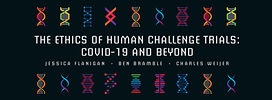Thanks to Jessica Flanigan for her thoughtful reply. My answer to Flanigan’s questions boils down to the following:
What sort of people do we want to be in our society? Do we want to be (A) the sort who would willingly bear some small costs so that others don’t have to risk their lives, or (B) the sort who would allow some people to risk their lives so that the rest of us don’t have to bear small costs?
I would suggest that we should dearly want to be (A), for the following reason: (B) are simply not the sort of people who can maximally flourish. They are narrowly focused on themselves, mean, small-hearted. By contrast, it is big-hearted people who have the emotional capacities to maximally flourish in their lives.
If we’re to have a society in which people can maximally flourish (which of course we should be aiming for), we need people to be (A) rather than (B). We should be prioritizing actions that make it more likely that people will be (A) rather than (B). Collective actions not only reflect, but (partly) determine, our character.
Making decisions like undertaking challenge trials makes us more like (B) than (A). It reinforces our existing tendencies to be more like (B) than (A).
This is the key: For all our sakes, we must prioritize becoming big-hearted, empathetic people. Challenge trials save lives, but at the cost of shrinking our collective hearts, and so limiting the well-being we can all enjoy.
By contrast, to directly answer one of Flanigan’s questions, allowing some people to continue in their roles as essential workers, or to participate in standard vaccine testing, does not have the cost I have just mentioned. The happiest, most flourishing sort of people would allow some others to take the kinds of risks involved in these areas, given the need to do so and providing the risks are kept to a minimum.
To repeat and emphasize, I do not claim that challenge trials are never morally acceptable. My claim is only that they are unacceptable given our decent alternatives in present circumstances.
I’ll close by responding to Flanigan’s final question about consent. She writes:
Public officials should adopt a presumption in favor of permitting people to make voluntary decisions about their own bodies, as long as those decisions don’t violate others’ rights. Challenge trials are voluntary decisions that do not violate others’ rights, so officials should adopt a presumption in favor of allowing challenge trials.
It is not the individual actions of challenge trial participants that harm others, but the government’s act of organizing or allowing challenge trials to go ahead that does so. It harms people in the ways mentioned above, by making many of us colder and smaller-hearted, and thereby reducing future people’s abilities to flourish.
What if some people decided to do challenge trials in secret, without government permission, and then released the results themselves? This seems to me less problematic because it wouldn’t be a collective decision, one that had as big an impact on the sort of people we would likely become in the future.

